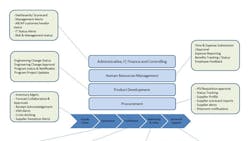Three-step Process for Mid-sized Manufacturers to Implement Mobile Apps
According to a recent Forrester study, businesses of all sizes are increasingly seeing mobile as an opportunity to drive innovation across a wide range of business processes. However, if you are a mid-sized manufacturer with small IT budgets and limited technology expertise, how do you embrace mobile computing to keep pace with your competition? This article highlights a three step process to ensure your mobile-journey is affordable, yet meets your strategic business objectives.
Step #1: The first step is to start with the pre-packaged mobile capabilities provided by your ERP vendor. Since such capabilities are pre-packaged and extend your already-implemented business processes to mobile, they are easier to deploy.
Such capabilities typically fall into three categories:
- Simple horizontal mobile apps to reduce administrative workload by enabling employees to perform basic day-to-day tasks on their mobile devices. Examples of such apps include enabling employees to view and complete approval requests (such as for purchase orders, invoices etc.; and viewing reports/dashboards with the ability to drill-down further to access the relevant data or metric.
- Mobile CRM apps that enable the sales reps, field service staff and their managers to access information about their customers where ever they are instead of needing to call the office to chase the information down. This includes ability to:
- Access Account Information: Allows sales reps to capture, monitor and view key information about prospects, and customers on their mobile devices. It also provides them the ability to view customer/prospect history as new opportunities arise.
- Manage Pipeline: Allows sales reps and their managers to view and update sales leads and opportunities on their mobile devices.
- Manage Account Activity: Enables sales reps and managers to view and update upcoming tasks and scheduled activities pertaining to a specific customer or partner on their mobile devices.
- Run Reports: Enables sales managers to view charts and reports such as sales pipeline, top opportunities and top sales orders on their mobile devices
- Mobile apps that mobile-enable your inventory and logistics processes. This includes ability to monitor inventory levels, perform simple inventory transactions, and access detailed information about products, including purchasing and sales price, available quantity, manufacturer, shipping type, product specifications, and images.
This first step delivers the low hanging fruit, while giving you the experience and expertise you need to take the next step.
Step #2: After you have implemented the portfolio of mobile apps from your ERP provider, the next suggested step is to look for industry or functional apps available from the ecosystem of your ERP vendor's ecosystem. Unlike the 'winner take all' stakes in mobile consumer apps (where a popular game such as Angry Birds makes most of the money in mobile games), ISVs and resellers can easily monetize an app they have built for a specific industry or functional requirement by making it available to other relevant customers of the ERP vendor. As a result a library of supported apps is often available from the partners in the ERP vendor's ecosystem. Some of these apps may be very relevant for you and (because they come from your ERP vendor's ecosystem) they plug directly into your back office system saving you precious integration time and expense. Figure below shows the various mobile apps that a manufacturer can deploy -- some may be available directly from your ERP vendor, others from their ecosystem of partners.
Examples of industry-specific apps available from your ERP partner's ecosystem include:
- Maintenance management app in manufacturing plants that enables service staff to verify the maintenance order including tasks and materials needed and execute the order -- all from mobile devices when standing next to the equipment.
- Collaborative project management in the engineering industries to address a need for real-time visibility and communication for both off-site monitoring from company headquarters and on-site inspection and reporting at the project location.
- Meter reading apps in the utilities industry that enables workers at these utilities that have not implemented smart meters, to enter meter reading directly into the mobile devices, so data can immediately be uploaded into the back-office ERP systems to create invoices.
When you are at either step 1 or 2, you may also consider hosting options to reduce the complexity you have to deal with. The reason is that your mobile application usage can change dramatically overnight and if your infrastructure can not keep pace with the scalability requirements, the adoption could suffer.
Step #3: Once your organization has implemented the mobile applications provided by your ERP vendor or their partners, you may find the need to develop your own custom apps to mobile-enable certain processes. At that stage, you should consider deploying a mobile platform (step 3) to develop new apps, integrate them to multiple backend applications, support different mobile device types, as well as to manage and scale their infrastructure. With an in-house mobile platform, organizations can develop and expand their own custom apps -- in areas that are unique to their business and industry such as schedule and proof of delivery, project estimation, order management etc. -- with low ongoing costs. In addition, as organizations support multiple apps on multiple devices and/or on multiple device platforms and try to ensure corporate security policies are applied on every device, it inevitably creates a complex environment which ultimately increases management and integration costs. Key is to choose a mobile development platform using which an IT organization can easily create, manage and deploy multiple mobile applications that securely connect a variety of back-end data sources to all major device types.
This three step process should enable a mid-sized manufacturer to start small, get the right set of mobile apps successfully deployed and then use the expertise gained to build and deploy more advanced mobile apps in their environment.
Hande Bolukbasi is senior manager, SME (Small Business and Midsize Enterprises) Solutions Marketing at SAP .
